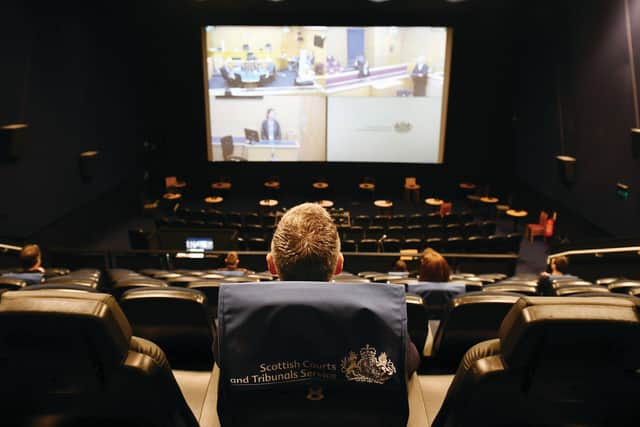How Scotland's legal sector has adapted to the challenges of Brexit and Covid-19


The legal profession was not immune from the ongoing impact of Covid-19 and grappled with lockdowns, restrictions and the passing of numerous pieces of legislation designed to support companies in all sectors. At the same time, seemingly impossible issues raised by Brexit have had to be dealt with.
But solicitors have shown resilience and have continued to advise clients to help them keep on top of the changing environment, while trying, where possible, to get on with business as usual.
Advertisement
Hide AdAdvertisement
Hide AdNick Scott, managing partner at Brodies, says: “I have been struck by the resilience and ingenuity of our profession. Looking after their teams and maintaining client service has tested firms right across Scotland. But they have adapted with remarkable speed and many have continued to invest for the future, just as we have.”


One of the big features of the past year has been how quickly remote and flexible working have become the norm and the speed at which new technology has been adopted for internal and external communications by law firms.
Ewan Alexander, partner and head of office, Edinburgh for Pinsent Mason, says: “We were already an agile working organisation and we had all the systems and processes in place to facilitate working remotely and therefore coped well with it, and as a result were able to respond to client demands and service client needs with very limited disruption.”
Murray McCall, managing partner at Anderson Strathern, says: “The pandemic has obviously changed working patterns for most people and has forced organisations into new ways of working and adoption of new technologies. I think all of that is here to stay.”
He believes this shift will be of huge benefit to employees and says his firm is looking at more creative ways of attracting and retaining top talent.
But many in the profession are keen to see some return to the office, or at least a hybrid working model.
Andrew Chalmers, managing partner at Davidson Chalmers Stewart, says: “In many respects, the communication structures that have gone into place since the onset of Covid have been an improvement on what was in place prior to the pandemic. Some form of remote working practices will undoubtedly continue, and this is to be welcomed as it opens up more possibilities in terms of inclusion. We are, however, also keen to restore the best aspects of the office environment as there’s still no substitute for the impromptu ‘water-cooler’ chat.”
Another area where technology has had to come to the forefront is around the Scottish Courts and Tribunal Service turning cinemas into virtual courtrooms. McCall says: “This is something I certainly never imagined I would see. The remote jury centres in Odeon cinemas helped deal with the backlog that arose from lockdown restrictions.”
Advertisement
Hide AdAdvertisement
Hide AdEuan McSherry, partner and head of dispute resolution, at Aberdein Considine, says: “The Scottish court system’s response to the pandemic, in part, has seen far greater use of digital technology. This has not been universally welcomed. Whether virtual courts will survive, in whole or in part, in the coming years remains to be seen. We have seen a marked reduction in costs for clients as a result, in part, of the use of virtual courts.”
Claire Armstrong, managing partner of Dentons in Scotland, says that a great example of how the profession has successfully reacted to some of the disruption is the way in which her dispute resolution colleagues have embraced virtual hearings, creating a virtual court room in their offices for clients, counsel and lawyers.
She says: “They have created a more productive and realistic experience for our clients and we have run two large public inquiries, a court of session proof and another high-profile litigation in this way.
“Virtual hearings are likely to be here to stay in some shape and form and we are looking at having permanent facilities to allow our clients to have a virtual court room experience.”
Scott says: “A remarkable thing about the pandemic was the speed with which clients – existing and new – adapted to working online. That adaptability meant that we won work from clients whom our lawyers had never physically met.
“On the colleague side too, we had people join our firm, some of whom have been with us now for over a year, and have yet to meet their fellow colleagues in person.
“The pandemic’s impact on technology and acceleration of its use has really broken down geography as a barrier. Clients on islands can get access to lawyers on the mainland, we can work in the same way with a client overseas as one in Scotland, and colleagues can work from anywhere.”
Scott also believes new ways of working can help with the legal profession’s drive to increase diversity and be more inclusive.
Advertisement
Hide AdAdvertisement
Hide AdIn July, the Law Society of Scotland published diversity data that it said gave the most complete picture yet of the profession. It showed that while progress is being made in this area, much remains to be done. For example, it still appears to be harder for people from lower socio-economic backgrounds to enter the profession.
Scott says: “Diversity and inclusion is an area in the legal sector where progress has been made, but improvement continues to be required. This year marks the tenth anniversary of PRIME, the work experience-based initiative that aims to encourage greater diversity in the legal profession. As a board member of PRIME, I encourage as many Scottish firms as possible to make the PRIME commitment and take their part in helping to create more opportunities across our profession.”
Shepherd and Wedderburn chairwoman, Gillian Carty, who leads the firm’s people strategy, has said the findings of the Law Society research made “pretty sobering reading for anyone in the legal profession”. She says: “The representation of lawyers from minority ethnic backgrounds, whether that’s in Scotland or the City of London, is not high in commercial legal practice.”
Peter Lawson, chairman at Burness Paull, says that over the past two years the inclusion and well-being agenda has grown exponentially in tandem with the increasing emphasis on environmental, social and corporate governance (ESG) for responsible employers.
He expects this trend will continue, and has therefore appointed a dedicated inclusion and wellbeing manager who works with colleagues across the firm to embed the core values of respect,inclusion and well-being in everything its does.
While Covid-19 has dominated the last year, Brexit is also having an impact. Allan Wernham, managing director (Scotland) at CMS, observes: “While some aspects of the economy are booming, many sectors, such as tourism, retail, and hospitality, continue to face huge challenges as we emerge from the pandemic. Others, notably food processing and construction, are now facing labour shortages, due in part to Covid-19 but also due to Brexit.”
He adds that Brexit is also likely to affect Scottish universities, with fewer foreign applicants expected as tuition fees will no longer be subsidised for European Union students from the 2021-22 academic year. “Given universities’ role as key breeding grounds for new organisations and innovative start-ups, this could also have implications for the wider economy,” he warns.
Turning to legal aid, the system has continued to come in for criticism over the last year. Responding to to the announcement in September of the Scottish Government’s programme for government for 2021-22, the Law Society of Scotland criticised the lack of progress on legal aid reform. It points out that an independent legal aid review, which reported more than three years ago, recommended an overhaul of the system. However, while the government has committed to a Legal Aid Reform Bill in this Parliament, any substantive reform must wait until autumn 2022 at the earliest.
Advertisement
Hide AdAdvertisement
Hide AdKen Dalling, president of the Law Society of Scotland, said the number of firms providing criminal legal aid has dropped by 25 per cent in the past decade. The impact of the Covid-19 pandemic has accelerated that decline, with more firms closing. He says: “At a time when we need more people to work through the growing backlog of cases, we are seeing solicitors leaving the legal aid sector because it is no longer viable.”
Climate change has also been high on the agenda this year, particularly as Scotland prepared to host the COP26 conference in Glasgow which has shone a spotlight on the country’s ambition of reaching net zero emissions by 2045.
Anderson Strathern states that approaches to working must be modernised to increase the contribution to the zero-carbon agenda. McCall adds: “That means everyone playing their part in conserving energy, reducing unnecessary travel, continuing to go ‘paper-lite’ and working much smarter. The legal profession has not always been great at adapting quickly to modern times but needs to do so with the green agenda.”
Lawson says: “The transition to a low-carbon future will impact more companies and draw in a wider range of technologies, and we are perfectly placed to support clients on the rapidly-evolving energy agenda as businesses of all types align themselves to comply with the ESG principles and embrace a zero-carbon future.”
In a major recent development, on 1 October the Scottish Government launched a 12-week consultation on Legal Services Regulation Reform in Scotland. It is being predicted that this could bring the most most far-reaching consequences for solicitors in a generation. The Law Society of Scotland stated that while major reform is needed to the regulatory environment, it cautioned against changes which could increase costs on consumers and damage the competitiveness of Scottish legal firms.
Dalling says that reforms to the current system are long overdue, as much of the legislation covering legal regulation is more than 40 years old and has failed to keep pace with modern practice.
He says: “The system for handling legal complaints is slow, complex and expensive to operate. Rigid regulatory processes all too often place a straitjacket on the Law Society and prevent us from stepping in quickly to protect the public interest when we need to. This is why we have repeatedly pressed the Scottish Government to bring forward reform.”
But he warns that the consultation risks undoing much of what already works well in the current system. He said the government paper presents an option of creating a brand-new regulatory body, adding substantial costs which consumers would ultimately have to bear. “This threatens the competitiveness of the Scottish legal sector, just as we recover from the Covid pandemic, and risks a loss of jobs to other parts of the UK.”
This article first appeared in The Scotsman’s Legal Review 2021